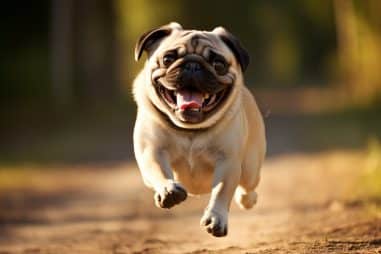Pugs are one of the most charming and loved dog breeds around. With their wrinkled faces and big, expressive eyes, they’re hard to resist! One thing that many pug owners notice is that these little furballs seem to sleep a lot. But just how much sleep do they need? Let’s dive into the world of pug sleep and find out.
Understanding Dog Sleep Patterns
You might have noticed that your pug seems to sleep more than you do. And there’s a reason for that. Dogs, including pugs, have different sleep patterns than humans.
While humans enter the deep REM (Rapid Eye Movement) sleep after about 90 minutes of falling asleep, dogs get there much faster. In fact, they can hit REM sleep in just about 15 minutes! That’s why you might see your pug twitching or moving their paws as if they’re running in a dream.
However, because they enter REM so quickly, their sleep cycles are also shorter. So, they wake up more often and then go back to sleep. Think of it as taking several short naps throughout the day.
How Long Pugs Typically Sleep
On average, a healthy adult pug will sleep about 12 to 14 hours a day. But remember, this isn’t all in one go. It’s spread out in naps throughout the day and night. Some pugs might even sleep up to 16 hours, especially if it’s cold or rainy outside.
Compared to other breeds, pugs don’t sleep an unusual amount. They’re pretty average in their sleep needs.
Factors Influencing Pug Sleep Duration
When it comes to pugs, there are some unique factors that can influence how much they sleep. Let’s dive deeper into the specifics related to this charming breed.
Breathing and Anatomy
Pugs belong to the group of dogs known as brachycephalic breeds. This means they have a short and flat skull shape. Because of this, pugs often have breathing difficulties. Their compact nasal passages make it harder for them to get a full breath, which can tire them out more quickly. As a result, they might need more rest compared to other breeds.
Weight
Pugs love their food, and sometimes, they can become a bit chubby. Carrying extra weight can be tiring for them. Overweight pugs often sleep more because they tire out faster from carrying those extra pounds. It’s essential to keep your pug’s weight in check to ensure they’re active and healthy.
Sensitivity to Temperature
Pugs are sensitive to extreme temperatures. In hot weather, they can overheat quickly, and in cold weather, they can feel chilly. When the weather isn’t comfortable, pugs prefer to stay indoors and nap. Always ensure your pug has a cool place in the summer and a warm spot in the winter.
Emotional Bond
Pugs are incredibly attached to their humans. They thrive on attention and love. If you’re away for long periods or if there’s a change in the household, like a new pet or a baby, your pug might feel stressed or anxious. This can influence their sleep patterns, making them sleep more or less than usual.
Diet
What your pug eats plays a role in their energy levels. A diet high in carbohydrates can cause spikes and crashes in energy, leading to irregular sleep. On the other hand, a balanced diet with the right nutrients can help regulate your pug’s sleep.
Activity and Stimulation
Pugs are playful and curious by nature. If they don’t get enough mental and physical stimulation, they can get bored. A bored pug is likely to nap more. Ensure you have play sessions, walks, and maybe even some puzzle toys to keep your pug engaged.
In conclusion, while there are general factors that influence all dogs’ sleep duration, pugs have their own set of unique characteristics that can affect their snooze time. By understanding these factors, you can ensure your pug gets the right amount of rest and stays happy and healthy.
The Importance of Quality Sleep for Pugs
Sleep isn’t just about resting. It plays a big role in your pug’s health.
Good sleep helps with muscle growth, memory, and overall well-being. If your pug is always tired or doesn’t want to play, they might not be getting enough quality sleep.
Signs that your pug isn’t sleeping well include being grumpy, not eating well, or being more clumsy than usual.
Setting Up the Perfect Sleep Environment for Your Pug
Your pug deserves a cozy spot to snooze. Here are some tips:
- The Right Bed: Choose a bed that’s soft and the right size. Pugs love to curl up, so a round bed might be perfect.
- Quiet Spot: Place their bed in a quiet corner where they won’t be disturbed by loud noises or other pets.
- Consistent Schedule: Try to keep a regular schedule. This means feeding, playtime, and bedtime happen at roughly the same time every day.
When to Be Concerned About Your Pug’s Sleep
Pugs, with their adorable squished faces and delightful snores, are known to enjoy their fair share of naps. However, as a caring pug parent, it’s essential to recognize when your pug’s sleep patterns might be cause for concern. Let’s explore some signs and situations that might warrant a closer look.
Drastic Changes in Sleep Duration
While pugs love their sleep, sudden and drastic changes in their sleep patterns can be a red flag. If your usually active pug starts sleeping excessively or, conversely, if your always-sleepy pug suddenly becomes restless, it’s worth noting.
Difficulty Breathing During Sleep
Because of their flat faces, pugs can sometimes have breathing difficulties. If you notice your pug struggling to breathe, gasping, or choking during their sleep, it could indicate a respiratory issue. Continuous loud snoring, while common in pugs, should also be monitored for any irregularities.
Restlessness
If your pug seems restless, constantly waking up, changing positions, or seems unable to settle down comfortably, it might be a sign of discomfort or pain. This behavior can be due to issues ranging from joint pain to internal ailments.
Changes in Posture While Sleeping
While it’s cute to see your pug sleeping on their back with their paws up, consistently seeing them in an unusual posture, like sleeping with their head elevated, might indicate they’re trying to alleviate some discomfort or breathing difficulty.
Lack of Energy When Awake
If after a good nap, your pug still seems lethargic or uninterested in play, there might be an underlying issue. Sleep should rejuvenate your pug, not leave them tired.
Frequent Night Waking
While it’s normal for dogs to wake up during the night, if your pug seems to be waking up frequently or seems agitated during the night, it’s worth exploring further.
Behavioral Changes
Any sudden behavioral changes connected to sleep, like becoming aggressive when disturbed from sleep or seeming disoriented upon waking, can be a sign of a medical or neurological issue.
Other Symptoms Accompanying Sleep Changes
If your pug’s change in sleep is accompanied by other symptoms like changes in appetite, unusual bathroom habits, or unexplained weight loss or gain, it’s essential to consult a vet.
Conclusion
Understanding your pug’s sleep is essential for their happiness and health. By setting up a comfy sleep environment and keeping an eye out for any changes, you’re ensuring your furry friend has many happy, healthy years ahead. So, the next time your pug drifts off into dreamland, you’ll know they’re getting the rest they need. Sweet dreams!








